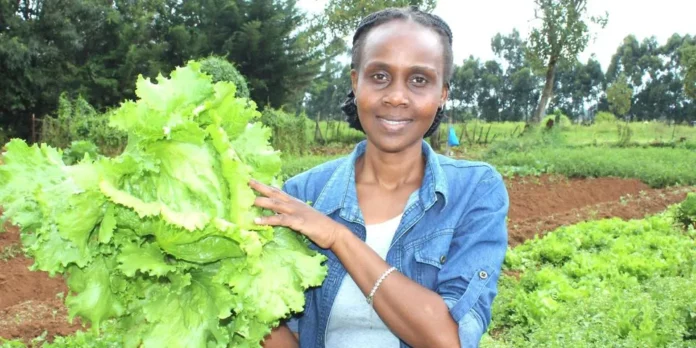Julie Barmasai, a former part-time lecturer at Moi University, decided to leave her job for the farms in 2018. Christened Garden Picks Produce, Julie’s farm is located in Ngeria, Uasin Gishu County.
She farms on a marginal 2 acres of her family’s 200 acres of land covered by Maize and Wheat when laden with produce.
However, she chose a separate path. She plants horticultural crops on her portion.
Julie Barmasai quit her lecturing job after realizing the farm was rewarding as compared to being a part-time lecturer. Prior to 2018, Julie had done conventional farming since 2014.
“I was struggling to get classes to teach. I would be given 3 to 4 classes in a week, which left me with plenty of time on my hands,” she says.
“Again, I was making little money since part-time lecturers are paid as per class taught,” Julie adds.
Julie has a Bachelor of Communication and Public Relations from Daystar University and also a Master in Development Studies.
When she quit her job, Julie decided to change her farming strategy from conventional farming to a more organic-based approach.
“There is a huge demand for organic produce in Eldoret. I sell mine to households, retail shops and groceries in the town and its environs,” Julie explained.
“I serve up to 15 households which consistently buy my produce monthly.”
Julie has employed 3 farmhands. She grows 30 varieties of vegetables and herbs. They include cucumber, sugarloaf cabbage, nightshade (managu), amaranth (terere), broccoli, lettuce, thyme and basil.
Others are garlic, celery, parsley, cauliflower, courgette, beetroot, curly kale, pepper mint, normal mint, Indian spinach, lemon grass and Fenugreek (Methi plant). She farms all of these organically.
To ensure her farming practices are sustainable, Julie utilizes organic manure from sheep, chickens and cows that she sources from her family’s farm.
Additionally, she practices intercropping by planting other plants, like marigold, which attracts bees and helps control pests.
Julie utilizes a homemade pesticide made of dried chillies or garlic mixed with water to control pests and diseases in her crops.
READ: Joreen Kinyua: I Make Sh 400k Monthly From Selling Honey
“But in most cases, organically grown crops develop their own self-defense system against pests and diseases, thus requiring fewer interventions.”
Julie’s farming techniques also include crop rotation and companion farming to improve soil fertility and prevent diseases. After each harvest, she replaces the crop with a different one from a separate family to minimize the occurrence of soil-borne diseases.
Furthermore, she plants crops that support each other close and those that are harmful to each other far apart. For example, cabbage and white collards, which are prone to the same pests, are planted separately.
She uses overhead sprinkler irrigation in dry months like January to March and gets water from an adjacent swamp.
Along with other farmers, Julie participates in an open-air organic market held every weekend along the Eldoret-Kapsebet Road to tap into the increasing demand for organic produce.
However, some crops, such as French beans, do not thrive under organic farming, so Julie resorts to controlled chemical use for these crops.
“For now, I want to concentrate on farming sine it is a rewarding venture. My goal is to train more people to grow organic foods,” Julie concluded.









